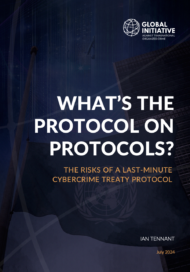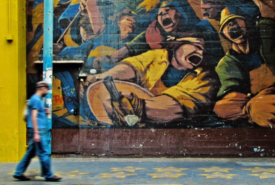Posted on 09 Mar 2021
In this second review of the Kyoto Declaration, we examine what the declaration tells us about international priorities on transnational organized crime and assess what has been left out of the wording, given the sheer scale of the challenge.
Despite the downgrading of civil society’s role in the Kyoto Declaration, there are some positive and more nuanced elements to take away. For instance, in the declaration there is a solid understanding of crime as a development issue; there is welcome support for journalists, with a call to cease violence against them; and there are references to issues such as hate crime and domestic violence. But, unfortunately, the overarching response to these issues does not venture beyond reaffirming existing commitments and instruments, despite the scale of the challenge that we face.
The current 14th UN Congress on Crime Prevention and Criminal Justice continues the tradition of producing a declaration, which is effectively a document that represents the congress’s outcome. It also continues the trend for the increasing length of the declaration that has developed since the first congress. At 17 pages, this is the longest Crime Congress Declaration so far. This long declaration unfortunately does not, however, include new ideas or approaches, but sticks to reaffirming existing agreements.
The opening of the declaration makes some strong statements about the scale and challenge of crime, and how addressing it is linked to the achievement of the Sustainable Development Goals. This was emphasized by most speakers in the High Level Segment of the Congress over the last two days. This reflects a growing recognition by states of crime as a development issue, and not just a law enforcement one. This is something that has not always been accepted, especially in multilateral discussions in Vienna.
However, this understanding is not mirrored by an emphasis on how the response to organized crime needs to take a holistic, cross-UN development approach. Instead, it merely reaffirms the centrality of the UN Office on Drugs and Crime, and the UN Commission on Crime Prevention and Criminal Justice (CCPCJ), and calls for a focus on law enforcement and state responses (as highlighted in Part 1 of this analysis). Similarly, the UN Convention against Transnational Organized Crime (UNTOC), the UN Convention against Corruption (UNCAC), and international drug control conventions are cited as the core international instruments, the most recent of these instruments is the UNCAC (adopted in 2003).
Where new or topical issues are mentioned in the declaration, there are no new agreements or meaningful steps forward other than reiterating these existing instruments and responses.
The declaration rightly recognizes that the COVID-19 pandemic has caused social and economic harm, and has created opportunities for organized crime. However, the burden of response here is again placed at the state level, with a commitment to strengthen resilience of law enforcement and other criminal justice institutions.
Crime prevention and rule of law
The declaration addresses the need to tackle the root causes of and risk factors for crime. It urges states to increase the quality and effectiveness of data to inform crime prevention strategies, promote asset confiscation and seizure, and community-oriented policing, and to prevent gang-related urban crime. There are references to gender and youth, and the prevention of domestic violence – all aspects that are to be welcomed.
Although the range of issues and considerations is positive, where the declaration suffers is in the overarching state-centric approach that it adopts generally. For example, the declaration urges states to ‘ensure the integrity and impartiality of law enforcement and other institutions’, as well as the independence of the judiciary, and to ensure that justice is fair, effective and accountable, among other things. The problem here is in the missing detail: the declaration does not provide information or tools for follow-up; nor does it attempt to address the fact that the failure of the rule of law around the world is one of the main causes of the prevalence and growth of organized crime and corruption.
Organized crime and corruption
Alongside the call for states to ratify and implement the UNTOC and the UNCAC, there is a reference to disrupting the links between organized crime and corruption, something that is rising up the international agenda, as demonstrated by its status as a priority issue for this year’s G20 Anti-Corruption Working Group. This hopefully points to a commitment to a more coordinated response to illicit finance, corruption and organized crime.
Protecting journalists
Despite Chinese and Iranian objections throughout the negotiations, the congress has secured a relatively strong commitment to end impunity for violence against journalists, despite one caveat (‘in accordance with national legislation and applicable international law’). A welcome next step would be to ensure that other civil society activists and organizations that report on organized crime receive the same recognition as the media.
Terrorism and organized crime
This current congress continues a tendency observed in Vienna-based negotiations to not agree on the scale of the links between organized crime and terrorism. In this area, there have been heated disagreements between the delegations of Armenia and Azerbaijan, according to diplomats involved. The declaration makes reference to the need to undertake research into and action against ‘any existing, growing or potential links, in some cases’, which gives the impression that there may not be any links to investigate.
New and emerging forms of crime
The declaration calls on states to use the UNTOC to prevent and counter new and emerging forms of crime, and to share information through the CCPCJ. It reiterates existing approaches to the three UNTOC protocols (stretching the definition of ‘new and emerging’: trafficking in persons, smuggling of migrants and trafficking in firearms. Previously agreed UN wording is repeated or paraphrased in the declaration with regard to drugs, child sexual abuse and exploitation, wildlife trafficking, trafficking in falsified medical products, trafficking in cultural property, smuggling of commercial goods and cybercrime. There is also a commitment to strengthening measures to prosecute hate crimes.
The Kyoto Declaration does offer progress on the recognition of crime as a development issue, and embraces other topical issues of importance. However, on most counts it falls short in terms of matching the response to this understanding. Organized crime has grown exponentially since the adoption of the UNTOC in 2000. Along with corruption, it is endemic in societies around the world, despite the high ratification rate of the UNTOC and the UNCAC, instruments around which the responses are focused in this declaration.
Rather than reaffirming existing commitments, the international community needs to do more to consolidate and reboot approaches in the follow-up to this declaration, and in all other relevant UN forums. By the time of the next UN Crime Congress in 2025, the world, and the trajectory of organized crime, will have changed again. Organized crime is set to continue to develop, while development will continue to stall. It is high time to consider what needs to be done differently rather than reiterating earlier commitments.



